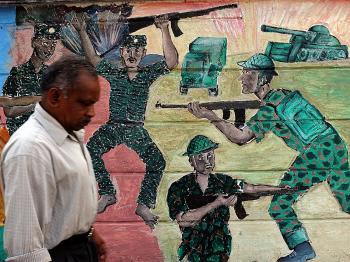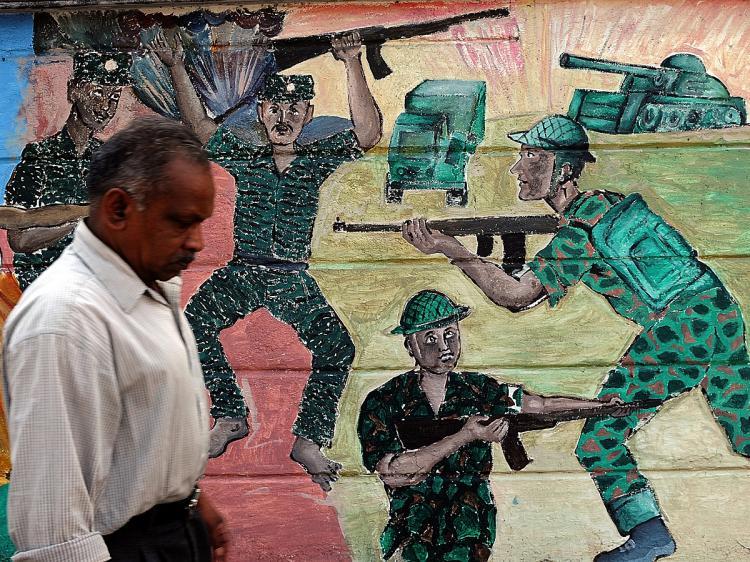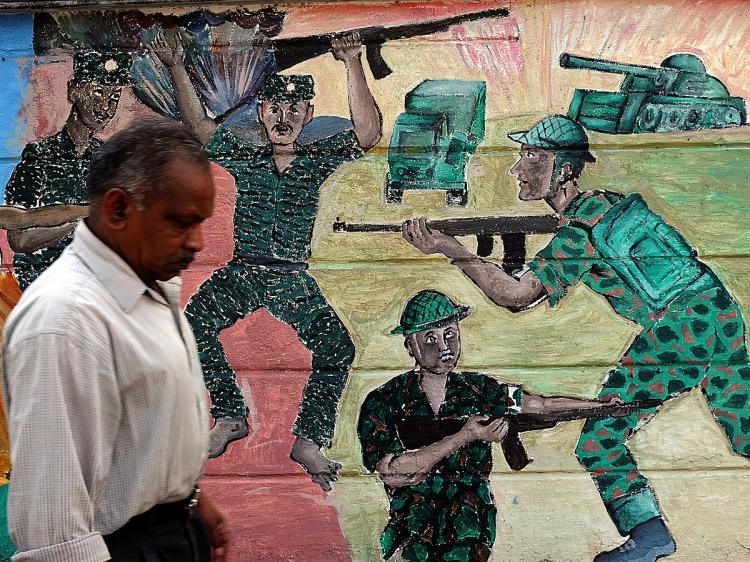The International Crisis Group published a report about war crimes in Sri Lanka, demanding that the U.N. and the United States take the initiative to respond to gathered evidence about the killing of civilians in the Vanni region between January and May 2009.
According to the group, known for its efforts to prevent deadly conflicts worldwide, there are reasonable grounds to believe that both Sri Lankan security forces and the Liberation Tigers of Tamil Eelam (LTTE) committed war crimes during the final stages of the conflict and that the violations during this period were worse than at any other time during the 30-year-long civil war. The group believes this requires a solid response by the international community.
They gathered evidence that shows that within this period tens of thousands of Tamil civilians, including men, women, children, and the elderly were killed, countless more were wounded, and hundreds of thousands were deprived of adequate food and medical care, resulting in more deaths.
Based on the evidence, the International Crisis Group has raised allegations against the Sri Lankan government, which the group thinks is sufficient to provoke an independent international investigation. Among the claims are the intentional shelling of civilians, hospitals, and humanitarian operations. The government of the country declined to respond to the Crisis Group’s request for comment on these allegations.
The LTTE were also found to have engaged in war crimes like firing on, killing, or wounding civilians in the conflict zone who were attempting to flee the shelling and enter government-controlled areas, and refusing to allow citizens of the country to leave the conflict zone, thus placing them in peril, or depriving them of humanitarian supplies, even when some of them were injured or dying.
Analysis of the situation reveals that many countries have declared the LTTE terrorists, but have failed to press the new government for political reforms and have even approved of its harsh measures, which have resulted in numerous deaths.
According to the Crisis Group, the war crimes in Sri Lanka have also undermined the authority of the United Nations, which did not apply enough pressure to ensure justice. The group says the U.N. has done too little to protect its national staff in Sri Lanka and allowed the government to intimidate and expel international staff. Also, by complying with the Sri Lankan government’s demand to withdraw from the Vanni, it undermined its humanitarian mandate.
The group says there is still a lack of political will to handle the crisis in Sri Lanka and bring war criminals to justice. The situation is worsened by the fact that Sri Lanka is not a member state of the International Criminal Court (ICC), and so there is only a small chance that the U.N. Security Council will refer these crimes to the ICC in the short term. A domestic prosecution would be impractical because of the culture of impunity in the country.
In light of these factors, the group recommends a U.N.-mandated inquiry combined with lawsuits in countries where victims of human rights violations committed abroad can sue the perpetrators, given the fact that the defendants are present in the territory of the country in question. The United States has a strong record of such lawsuits and could use this mechanism. The authors of the report, however, expressed concern that the U.S. government might be reluctant to interfere in such cases due to the scale of reported abuses in Sri Lanka.
The group also recommends that countries do not obstruct lawsuits against war criminals from Sri Lanka, do not extradite LTTE members to Sri Lanka where they stand little chance of a fair trial, and provide asylum or emergency visas to witnesses to alleged war crimes to ensure evidence is preserved.
The full text of the report can be found here: http://www.humansecuritygateway.com/documents/ICG_WarCrimesInSriLanka.pdf
According to the group, known for its efforts to prevent deadly conflicts worldwide, there are reasonable grounds to believe that both Sri Lankan security forces and the Liberation Tigers of Tamil Eelam (LTTE) committed war crimes during the final stages of the conflict and that the violations during this period were worse than at any other time during the 30-year-long civil war. The group believes this requires a solid response by the international community.
They gathered evidence that shows that within this period tens of thousands of Tamil civilians, including men, women, children, and the elderly were killed, countless more were wounded, and hundreds of thousands were deprived of adequate food and medical care, resulting in more deaths.
Based on the evidence, the International Crisis Group has raised allegations against the Sri Lankan government, which the group thinks is sufficient to provoke an independent international investigation. Among the claims are the intentional shelling of civilians, hospitals, and humanitarian operations. The government of the country declined to respond to the Crisis Group’s request for comment on these allegations.
The LTTE were also found to have engaged in war crimes like firing on, killing, or wounding civilians in the conflict zone who were attempting to flee the shelling and enter government-controlled areas, and refusing to allow citizens of the country to leave the conflict zone, thus placing them in peril, or depriving them of humanitarian supplies, even when some of them were injured or dying.
Analysis of the situation reveals that many countries have declared the LTTE terrorists, but have failed to press the new government for political reforms and have even approved of its harsh measures, which have resulted in numerous deaths.
According to the Crisis Group, the war crimes in Sri Lanka have also undermined the authority of the United Nations, which did not apply enough pressure to ensure justice. The group says the U.N. has done too little to protect its national staff in Sri Lanka and allowed the government to intimidate and expel international staff. Also, by complying with the Sri Lankan government’s demand to withdraw from the Vanni, it undermined its humanitarian mandate.
The group says there is still a lack of political will to handle the crisis in Sri Lanka and bring war criminals to justice. The situation is worsened by the fact that Sri Lanka is not a member state of the International Criminal Court (ICC), and so there is only a small chance that the U.N. Security Council will refer these crimes to the ICC in the short term. A domestic prosecution would be impractical because of the culture of impunity in the country.
In light of these factors, the group recommends a U.N.-mandated inquiry combined with lawsuits in countries where victims of human rights violations committed abroad can sue the perpetrators, given the fact that the defendants are present in the territory of the country in question. The United States has a strong record of such lawsuits and could use this mechanism. The authors of the report, however, expressed concern that the U.S. government might be reluctant to interfere in such cases due to the scale of reported abuses in Sri Lanka.
The group also recommends that countries do not obstruct lawsuits against war criminals from Sri Lanka, do not extradite LTTE members to Sri Lanka where they stand little chance of a fair trial, and provide asylum or emergency visas to witnesses to alleged war crimes to ensure evidence is preserved.
The full text of the report can be found here: http://www.humansecuritygateway.com/documents/ICG_WarCrimesInSriLanka.pdf







